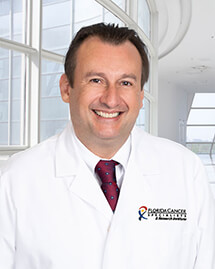Plasma Proteome–Based Test for First-Line Treatment Selection in Metastatic Non–Small Cell Lung Cancer
FCS medical oncologist and hematologist Ernesto Bustinza-Linares, MD has co-authored an abstract published in the American Society of Clinical Oncology Journal, JCO Precision Oncology, that uncovers a new testing method to determine personalized care options for patients with metastatic non-small cell lung cancer (NSCLC). The abstract’s authors address the limitations of existing guidelines that recommend checkpoint immunotherapy, sometimes in combination with chemotherapy, for treating NSCLC, which often discounts patient variability and immune factors. The findings from the study show that by incorporating additional plasma proteome-based testing, combined with the standard protein inhibitor testing, clear differences in patient outcomes were observed after applying targeted treatments based on the testing results.

